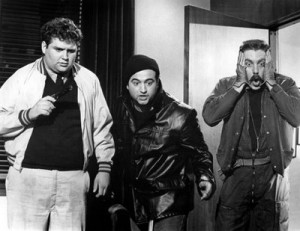Supermarkets in the UK are really, really super mad about the horse meat scandal.
Probably not as mad and violated as consumers, but hey, we’re all in this together right, retailers, consumers, you, me – except only one makes money on the deal.
And how well do retailers know their suppliers?
In a public letter, 11 firms, including Tesco and Asda, said they shared  shoppers’ “anger and outrage”.
shoppers’ “anger and outrage”.
BBC News reports UK retailers have rejected government criticism they “remained silent” over the horsemeat crisis – as they begin to release test results on beef products.
Earlier, Downing Street said big retailers selling affected products had a responsibility to answer key questions on the scandal.
Sources said it was not “acceptable for retailers to remain silent while customers have been misled about the content of the food they have been buying.”
Meanwhile, the results of up to one third of tests on the presence of horsemeat in processed meals ordered by the Food Standards Agency (FSA) are being released.
Whitbread, which supplies thousands of pubs and owns Premier Inn, Beefeater Grill and Brewers Fayre, has confirmed two of its products have been found to contain horsemeat.
Compass Group, one of the biggest school food providers in the UK, says its tests have found between 5% and 30% horse DNA in burgers it sold in Ireland and Northern Ireland.
Cottage pie delivered to 47 schools in Lancashire has tested positive for horse DNA. The product has now been withdrawn from kitchens. And beefburgers containing horsemeat had been withdrawn from hospitals in Northern Ireland.
That will be reassuring to parents and patients. You know, consumers, partners.
The French government has accused meat processing company Spanghero of knowingly selling horsemeat labeled as beef. The firm has denied the allegations, but apologized to British consumers, saying it was “tricked as well.”
Further to the arrests made yesterday in Wales and West Yorkshire in relation to suspected fraud, there have been seizures of evidence in Hull and London.
UK Food Safety Authority officers entered an additional three premises in England today with local authorities and the police; one was in Hull and two in Tottenham. Computers and documentary evidence have been removed from these premises, as well as meat samples that have been taken for testing.
FSA has submitted a full file and evidence on this issue to Europol.
France has pinned much of the blame for Europe’s meat scandal on a French firm that allegedly sold 750 tonnes of horsemeat as beef that ended up in millions of ready-to-eat meals sold across the continent.
Agence France-Presse reports Spanghero denied any wrongdoing, saying it had never ordered, received or resold any meat that it did not believe to be beef.
The findings of an investigation by France’s anti-fraud office, presented by the Consumer Affairs Minister, Benoit Hamon, were staggering.
It said Spanghero, a meat-processing firm in the southwestern town of Castelnaudary, had knowingly sold 750 tonnes of horsemeat mislabelled as beef over a period of six months, 500 tonnes of which were sent to French firm Comigel, which makes frozen meals at its Tavola factory in Luxembourg.
That meat was used to make 4.5 million products that were sold by Comigel to  28 companies in 13 European countries, it said.
28 companies in 13 European countries, it said.
Mr Hamon said Spanghero would be prosecuted and officials said its licence to handle meat would be suspended pending further investigations.
The minister said that Comigel, which supplied millions of ready-to-eat meals to supermarkets, which have now removed them from their shelves, had been deceived by Spanghero.
But he said Comigel had failed to carry out tests or inspect paperwork that would have alerted it to the scam. He said Romanian abattoirs named in the affair appeared to have acted in good faith.
